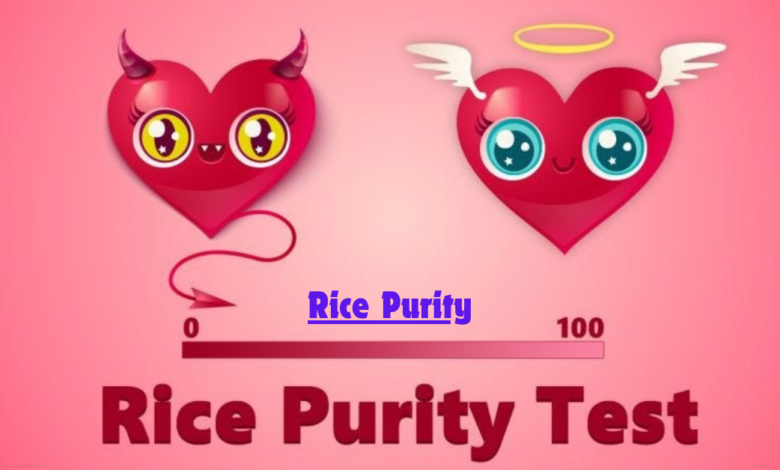The Rice Purity Test

Introduction
Where quizzes and surveys are abundant, the Rice Purity Test stands out as a unique and intriguing self-assessment tool. Originating from Rice University, this test has gained widespread popularity, particularly among college students and young adults. This article explores the history, purpose, and impact of the Rice Purity Test, shedding light on why it continues to captivate people around the world.
What is the Rice Purity Test?
Origins and History
The Rice Purity Test was created by students at Rice University in Houston, Texas, as a lighthearted way to assess one’s life experiences and level of innocence. The test consists of a series of 100 questions that cover various aspects of life, including relationships, substance use, and personal behavior. Initially intended as a fun activity, the test has evolved into a popular online quiz taken by millions.
Structure and Content
The questions in the Rice Purity Test are designed to be answered with a simple “yes” or “no.” Each question represents a specific experience, and the total score is calculated based on the number of “no” answers. A higher score indicates a higher level of purity or innocence, while a lower score suggests more life experiences and adventures.
Example Questions
Some common questions from the Rice Purity Test include:
- Have you ever held hands romantically?
- Have you ever been on a date?
- Have you ever consumed alcohol?
- Have you ever used drugs?
- Have you ever been arrested?
Purpose and Impact
Social and Cultural Significance
The Rice Purity Test serves as a conversation starter and a means for individuals to reflect on their personal experiences. It is often taken in group settings, such as college dormitories or social gatherings, where participants compare scores and share stories. This communal aspect fosters bonding and can lead to deeper discussions about life choices and experiences.
Psychological Insights
While the Rice Purity Test is primarily taken for fun, it can also provide psychological insights into one’s behavior and lifestyle. By reflecting on their answers, individuals may gain a better understanding of their personal boundaries, risk-taking tendencies, and social interactions. It can also highlight areas where individuals might want to make changes or seek personal growth.
Popularity Among College Students
The Rice Purity Test has become particularly popular among college students. It is often taken during the first weeks of college as a way for new students to break the ice and get to know each other. The test’s candid questions about relationships and personal experiences resonate with young adults who are navigating the complexities of newfound independence and social dynamics.
Interpreting the Results
Scoring and Meaning
The final score of the Rice Purity Test is calculated by subtracting the number of “yes” answers from 100. For example, if a person answers “yes” to 30 questions, their score would be 70. The score can range from 0 to 100, with 100 representing complete purity and 0 indicating a vast array of life experiences.
Understanding Different Scores
- 90-100: Highly pure, with few life experiences.
- 70-89: Relatively innocent, with some experiences.
- 40-69: Average range, with a mix of experiences.
- 20-39: More experienced and adventurous.
- 0-19: Very experienced, with a wide range of life activities.
Personal Reflection
The Rice Purity Test is not a scientifically validated assessment, and the scores should be interpreted with a sense of humor and self-awareness. It is important to remember that everyone’s life journey is unique, and there is no “right” or “wrong” score. The test can serve as a tool for self-reflection, helping individuals to consider their past actions and future goals.
Controversies and Criticisms
Ethical Concerns
The Rice Purity Test has faced criticism for its invasive and personal questions. Some argue that the test can make individuals uncomfortable or lead to feelings of inadequacy or judgment. It is essential to approach the test with sensitivity and respect for personal boundaries.
Cultural Sensitivity
The questions in the Rice Purity Test are based on experiences common to a specific cultural context. As a result, the test may not be relevant or appropriate for individuals from different cultural backgrounds. It is important to consider cultural differences and avoid making assumptions about others based on their test scores.
Potential for Misuse
There is a risk that the Rice Purity Test could be misused to shame or bully individuals based on their scores. It is crucial to promote a supportive and non-judgmental environment when discussing the test and to emphasize that it is meant for entertainment and self-reflection rather than comparison or competition.
Conclusion
The Rice Purity Test is a fascinating cultural phenomenon that offers a glimpse into the diverse experiences and adventures of individuals, particularly young adults. While it should be taken with a grain of salt and a sense of humor, the test can serve as a valuable tool for self-reflection and social bonding. By understanding its origins, purpose, and impact, we can appreciate the Rice Purity Test as more than just a quiz, but as a unique lens through which we can view our own life journeys.
FAQs:
What is the Rice Purity Test?
The Rice Purity Test is a self-assessment quiz consisting of 100 questions that measure an individual’s level of innocence or life experiences. It was created by students at Rice University and has become a popular online activity.
How is the Rice Purity Test scored?
The test is scored by answering “yes” or “no” to 100 questions. Each “no” answer adds to the score, with a higher score indicating higher purity or innocence. The final score ranges from 0 to 100.
Is the Rice Purity Test scientifically validated?
No, the Rice Purity Test is not a scientifically validated assessment. It is meant for entertainment and self-reflection rather than as a serious measure of one’s character or behavior.
Who typically takes the Rice Purity Test?
The Rice Purity Test is popular among college students and young adults. It is often taken in social settings as a way to bond and share personal experiences.
What does a high score on the Rice Purity Test mean?
A high score (90-100) indicates that the individual has had few life experiences and is considered highly pure or innocent.
What does a low score on the Rice Purity Test mean?
A low score (0-19) indicates that the individual has had a wide range of life experiences and is considered very experienced.
Are the questions on the Rice Purity Test invasive?
Some questions on the Rice Purity Test can be personal and invasive. It is important to approach the test with sensitivity and respect for personal boundaries.
Can the Rice Purity Test be culturally insensitive?
Yes, the questions are based on experiences common to a specific cultural context and may not be relevant or appropriate for individuals from different backgrounds. It is important to consider cultural differences when taking the test.
Is it okay to compare Rice Purity Test scores with others?
While comparing scores can be fun, it is essential to do so in a supportive and non-judgmental manner. Everyone’s life journey is unique, and the test should not be used to shame or bully others.
How should I interpret my Rice Purity Test score?
Your score should be interpreted with a sense of humor and self-awareness. The test is meant for entertainment and self-reflection, not as a definitive measure of your character or experiences.



